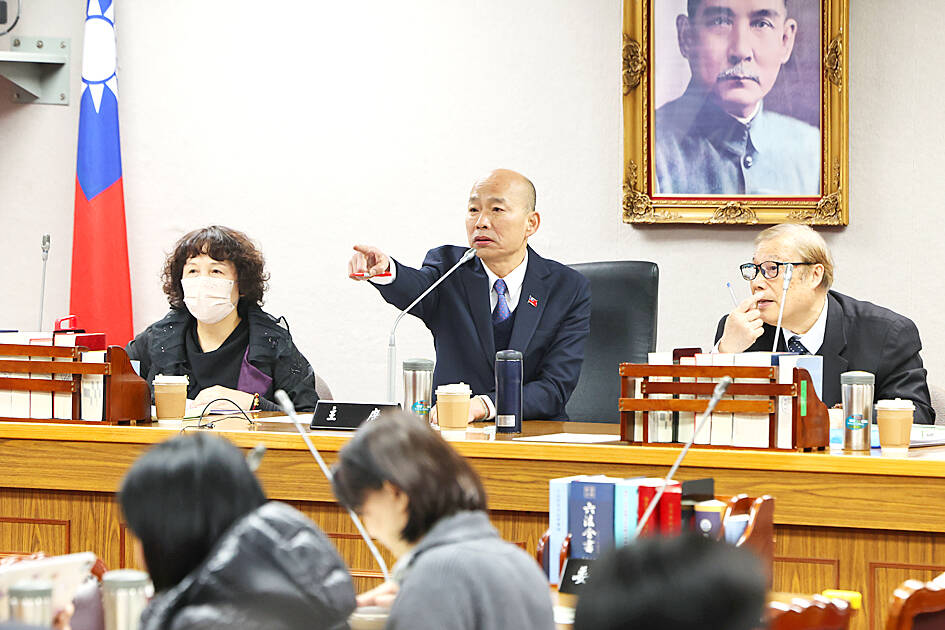Cross-party negotiations over the central government’s budget for this year are expected to continue today after lawmakers failed to reach a consensus amid heated debate yesterday.
With more than 3,000 proposals to review, the three days originally scheduled might not be enough for negations, Legislative Speaker Han Kuo-yu (韓國瑜) said.
If negotiations are not completed by tomorrow, the party caucuses should continue negotiations over the weekend, outside of plenary sessions, Han said.

Photo: CNA
The Chinese Nationalist Party (KMT) and the Taiwan People’s Party (TPP) caucuses were on the verge of proposing comprehensive cuts that would threaten to shut down multiple government ministries, Chinese-language media reported.
Cuts expected to be proposed by the KMT include suspending NT$1.8 billion (US$54.44 million) of the Ministry of National Defense’s NT$2 billion budget for an indigenous defense submarine program.
Other KMT proposals are expected to cut the operating budgets of the Ministry of Digital Affairs, the Ministry of Agriculture, the National Communications Commission (NCC) and the Mainland Affairs Council to NT$1 each, while other ministries would lose 70 percent of their operating budgets.
KMT caucus members called for all ministries to have their funding for public relations and media promotion struck entirely.
The proposals prompted criticism from officials, with several ministries warning that the normal functions of the government could not be maintained at the suggested funding levels.
Major General Hsin Yi-tsung (辛宜聰) from the Ministry of National Defense’s Comptroller Bureau said that a follow-up submarine construction program is a key part of the nation’s naval strategy and symbol of Taiwan’s resolve to defend itself.
The defense ministry urged lawmakers to pass the proposed submarine budget in its entirety to enable the navy to acquire eight boats as the legislature’s National Defense and Foreign Affairs Committee recommended, Hsin said.
Media reports that Minister of National Defense Wellington Koo (顧立雄) had agreed to cut the submarine budget following discussions with KMT lawmakers were false, Hsin said, adding that his ministry has made no changes to its policy recommendations.
The navy is completing harbor acceptance tests for a prototype submarine as planned and would never authorize additional vessels to be built without absolute confidence in their safety, Navy Deputy Chief of Staff Rear Admiral He Hung-hsuan (賀紘璿) said.
Minister of Health and Welfare Chiu Tai-yuan (邱泰源) told reporters on the sidelines of a legislative session that the government needs funding for public relations and media promotion to protect public health.
The government has important health initiatives, including expanded eligibility for free checkups for chronic diseases and cancer screenings, Chiu said.
A spokesperson for the Ministry of Digital Affairs said that cutting its operating budget to NT$1 would prevent officials from protecting Taiwan’s cybersecurity against state actors and scammers, or carrying out routine tasks to maintain Internet services.
NCC Secretary-General Huang Wen-che (黃文哲) said that the agency could not perform its regulatory functions or pay for office electricity bills if KMT lawmakers implement budget cuts as reported.
The Ministry of Agriculture in a statement said that the plan of the KMT and the TPP to cut its budget might lead to an unprecedented shutdown of its offices and services.
Such cuts would affect many things, including safety testing, occupational hazard insurance payouts for farmers, agricultural product information systems and benefits for elderly farmers, it said.
About 345,000 farmers are subscribed to the government-run farmers’ insurance system and 520,000 elderly farmers are entitled to benefits, it added.

Taiwan is to commence mass production of the Tien Kung (天弓, “Sky Bow”) III, IV and V missiles by the second quarter of this year if the legislature approves the government’s NT$1.25 trillion (US$39.78 billion) special defense budget, an official said yesterday. Commenting on condition of anonymity, a defense official with knowledge of the matter said that the advanced systems are expected to provide crucial capabilities against ballistic and cruise missiles for the proposed “T-Dome,” an advanced, multi-layered air defense network. The Tien Kung III is an air defense missile with a maximum interception altitude of 35km. The Tien Kung IV and V

The disruption of 941 flights in and out of Taiwan due to China’s large-scale military exercises was no accident, but rather the result of a “quasi-blockade” used to simulate creating the air and sea routes needed for an amphibious landing, a military expert said. The disruptions occurred on Tuesday and lasted about 10 hours as China conducted live-fire drills in the Taiwan Strait. The Civil Aviation Administration (CAA) said the exercises affected 857 international flights and 84 domestic flights, affecting more than 100,000 travelers. Su Tzu-yun (蘇紫雲), a research fellow at the government-sponsored Institute for National Defense and Security Research, said the air

Taiwan lacks effective and cost-efficient armaments to intercept rockets, making the planned “T-Dome” interception system necessary, two experts said on Tuesday. The concerns were raised after China’s military fired two waves of rockets during live-fire drills around Taiwan on Tuesday, part of two-day exercises code-named “Justice Mission 2025.” The first wave involved 17 rockets launched at 9am from Pingtan in China’s Fujian Province, according to Lieutenant General Hsieh Jih-sheng (謝日升) of the Office of the Deputy Chief of the General Staff for Intelligence at the Ministry of National Defense. Those rockets landed 70 nautical miles (129.6km) northeast of Keelung without flying over Taiwan,

A strong continental cold air mass is to bring pollutants to Taiwan from tomorrow, the Ministry of Environment said today, as it issued an “orange” air quality alert for most of the country. All of Taiwan except for Hualien and Taitung counties is to be under an “orange” air quality alert tomorrow, indicating air quality that is unhealthy for sensitive groups. In China, areas from Shandong to Shanghai have been enveloped in haze since Saturday, the ministry said in a news release. Yesterday, hourly concentrations of PM2.5 in these areas ranged from 65 to 160 micrograms per cubic meter (mg/m³), and pollutants were